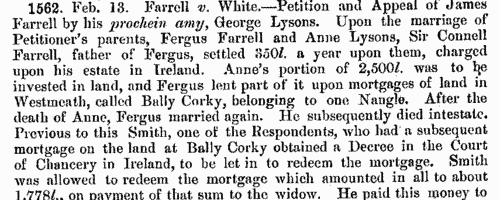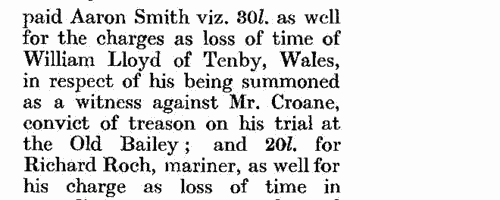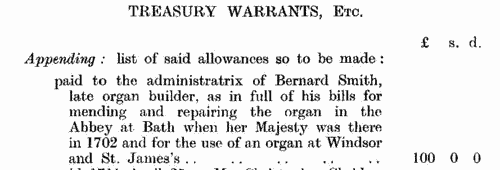Our indexes include entries for the spelling mews. In the period you have requested, we have the following 76 records (displaying 21 to 30):
House of Lords Proceedings
(1699-1702)
Private bills dealing with divorce, disputed and entailed estates: petitions, reports and commissions: naturalisation proceedings.
| Sample scan, click to enlarge

|
Treasury Books
(1702)
Records of the Treasury administration in Britain, America and the colonies, for 1702. Also includes Treasury minutes for early 1691; secret service accounts from 1689 to 1702, and accounts of the Civil List (royal expenditure) and army debts that had accumulated by the time of the death of king William III (8 March 1702).
| Sample scan, click to enlarge

|
Inhabitants of Rhode Island
(1678-1706)
Records of the colony of Rhode Island (Narragansett or King's Province) and Providence Plantations from August 1678 to October 1706 were edited by John Russell Bartlett, Secretary of State, and published by order of the General Assembly in 1858. The minutes of the general assembly have certain lacunae from those troubled times, in particular for the years 1687 to 1689 and 1691 to 1695. The text was supplemented with some material surviving in England in the Public Record Office. | Sample scan, click to enlarge

|
Treasury Books
(1712)
Records of the Treasury administration in Britain, America and the colonies, for 1712. These also include records of the appointment and replacement of customs officers such as tide waiters and surveyors. | Sample scan, click to enlarge

|
 Masters and Apprentices
(1714) Masters and Apprentices
(1714)
Apprenticeship indentures and clerks' articles were subject to a 6d or 12d per pound stamp duty: the registers of the payments usually give the master's trade, address, and occupation, and the apprentice's father's name and address, as well as details of the date and length of the apprenticeship. 12 April to 31 December 1714. | Sample scan, click to enlarge

|
 Masters and Apprentices
(1725) Masters and Apprentices
(1725)
Apprenticeship indentures and clerks' articles were subject to a 6d or 12d per pound stamp duty: the registers of the payments usually give the master's trade, address, and occupation, and the apprentice's father's name and address, as well as details of the date and length of the apprenticeship. 16 August to 31 December 1725. | Sample scan, click to enlarge

|
 Masters and Apprentices
(1732) Masters and Apprentices
(1732)
Apprenticeship indentures and clerks' articles were subject to a 6d or 12d per pound stamp duty: the registers of the payments usually give the master's trade, address, and occupation, and the apprentice's father's name and address, as well as details of the date and length of the apprenticeship. 3 January to 30 December 1732 | Sample scan, click to enlarge

|
 Masters and Apprentices
(1733) Masters and Apprentices
(1733)
Apprenticeship indentures and clerks' articles were subject to a 6d or 12d per pound stamp duty: the registers of the payments usually give the master's trade, address, and occupation, and the apprentice's father's name and address, as well as details of the date and length of the apprenticeship. 2 January to 2 August 1733 | Sample scan, click to enlarge

|
 Masters and Apprentices
(1737) Masters and Apprentices
(1737)
Apprenticeship indentures and clerks' articles were subject to a 6d or 12d per pound stamp duty: the registers of the payments usually give the master's trade, address, and occupation, and the apprentice's father's name and address, as well as details of the date and length of the apprenticeship. 1 January to 31 December 1737 | Sample scan, click to enlarge

|
 Masters and Apprentices
(1745) Masters and Apprentices
(1745)
Apprenticeship indentures and clerks' articles were subject to a 6d or 12d per pound stamp duty: the registers of the payments usually give the master's trade, address, and occupation, and the apprentice's father's name and address, as well as details of the date and length of the apprenticeship. | Sample scan, click to enlarge

|
Research your ancestry, family history, genealogy and one-name study by direct access to original records and archives indexed by surname.












